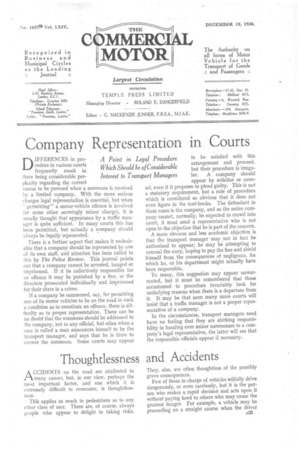Company Representation in Courts
Page 27

If you've noticed an error in this article please click here to report it so we can fix it.
DIFFERENCES in procedure in various courts frequently result in there being considerable perplexity regarding the correct course to he pursued when a summons is received by a limited company. With the more serious charges legal representation is essential, but when " permitting" a motor-vehicle offence is involved (or some other seemingly minor charge), it is usually thought that appearance by a traffic manager is quite sufficient. In many courts this has been permitted, but actually a company should always be legally represented.
There is a further aspect that makes it undesirable that a company should be represented by one of its own staff, and attention has been called to this by The Police Review. This journal points out that a company cannot be arrested, hanged or imprisoned. If it be collectively responsible for an offence it may be punished by a fine, or the directors prosecuted individually and imprisoned for their share in a crime.
If a company be summoned, say, for permitting one of its motor vehicles to be on the road in such a condition as to constitute an offence, there is difficulty as to proper representation. There can be no doubt that the summons should be addressed to the company, not to any official, but often when a case is called a man announces himself to be the transport manager, and says that he is there to answer the summons. Some courts may appear to be satisfied with this arrangement and proceed, but their procedure is irregular. A company should appear by solicitor or counsel, even if it proposes to plead guilty. This is not a statutory requirement, but a rule of procedure which is considered so obvious that it does not even figure in the text-books. The defendant in these cases is the company, and as the entire company cannot, normally, be expected to crowd into court, it must send a representative who is not open to the objection that he is part of the concern. A more obvious and less academic objection is that the transport manager may not in fact be authorized to appear; he may be attempting to conceal the story, hoping to pay the fine and shield himself from the consequences of negligence, fot which he, or his department might actually have been responsible.
To many, this suggestion may appear unwarranted, but it must be remembered that those accustomed to procedure invariably look for underlying reasons when there is a departure from it. It may be that soon many more courts will insist that a traffic manager is not a proper representative of a company.
In the circumstances, transport managers need have no feeling that they are shirking responsibility in handing over minor summonses to a company's legal representative, the latter will see that the responsible officials appear if necessary.




















































































